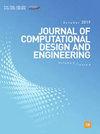针对多目标全通道污染路由问题的非支配排序简化蜂群优化技术
IF 4.8
2区 工程技术
Q1 COMPUTER SCIENCE, INTERDISCIPLINARY APPLICATIONS
引用次数: 0
摘要
交通部门的活动主要造成温室气体排放。交通部门的迅速扩张导致全球污染水平显著上升,对人类健康造成不利影响。为了解决温室气体排放问题,并提出降低车辆燃油消耗的有效解决方案,我们将环境因素与车辆路由问题(VRP)的核心原则相结合。这种整合产生了污染路由问题(PRP),其目的是优化路由决策,重点是最大限度地减少对环境的影响。与此同时,零售分销系统探索使用全方位渠道方法作为本研究采用的运输模式。本研究的目标包括最大限度地降低总旅行成本和燃料消耗,同时减少温室气体排放,促进环境的可持续发展,并通过整合线上和线下模式,提高顾客购物和取货的便利性。该问题为 NP-Hard,因此采用了非支配排序简化蜂群优化(NSSO)算法。NSSO 将非支配排序遗传算法 II(NSGA-II)的非支配技术与 SSO 的更新机制相结合,以获得一组帕累托最优解。此外,NSSO 是一种多目标进化算法,可用于解决多目标问题。利用 PRP 基准数据集,将结果与其他两种多目标进化算法进行了比较:NSGA-II 和非支配排序粒子群优化(NSPSO)。研究结果证实,与其他两种算法(NSGA-II 和 NSPSO)相比,NSSO 具有可行性,能提供良好的解决方案,而且收敛速度更快。本文章由计算机程序翻译,如有差异,请以英文原文为准。
Non-dominated sorting simplified swarm optimization for multi-objective omni-channel of pollution routing problem
The activities of the traffic department mainly contribute to the generation of greenhouse gas (GHG) emissions. The swift expansion of the traffic department results in a significant increase in global pollution levels, adversely affecting human health. To address GHG emissions and propose impactful solutions for reducing fuel consumption in vehicles, environmental considerations are integrated with the core principles of the Vehicle Routing Problem (VRP). This integration gives rise to the Pollution Routing Problem (PRP), which aims to optimize routing decisions with a focus on minimizing environmental impact. At the same time, the retail distribution system explores the use of an Omni-channel approach as a transportation mode adopted in this study. The objectives of this research include minimizing total travel costs and fuel consumption while aiming to reduce GHG emissions, promote environmental sustainability, and enhance the convenience of shopping and pickup for customers through the integration of online and offline modes. This problem is NP-Hard; therefore, the Non-dominated Sorting Simplified Swarm Optimization (NSSO) algorithm is employed. NSSO combines the non-dominated technique of Non-dominated Sorting Genetic Algorithm II (NSGA-II) with the update mechanism of SSO to obtain a set of Pareto optimal solutions. Moreover, the NSSO, a multi-objective evolutionary algorithm, is adopted to address multi-objective problems. The PRP benchmark dataset is utilized, and the results are compared with two other multi-objective evolutionary algorithms: NSGA-II and Non-dominated Sorting Particle Swarm Optimization (NSPSO). The findings of the study confirm that NSSO exhibits feasibility, provides good solutions, and achieves faster convergence compared to the other two algorithms, NSGA-II and NSPSO.
求助全文
通过发布文献求助,成功后即可免费获取论文全文。
去求助
来源期刊

Journal of Computational Design and Engineering
Computer Science-Human-Computer Interaction
CiteScore
7.70
自引率
20.40%
发文量
125
期刊介绍:
Journal of Computational Design and Engineering is an international journal that aims to provide academia and industry with a venue for rapid publication of research papers reporting innovative computational methods and applications to achieve a major breakthrough, practical improvements, and bold new research directions within a wide range of design and engineering:
• Theory and its progress in computational advancement for design and engineering
• Development of computational framework to support large scale design and engineering
• Interaction issues among human, designed artifacts, and systems
• Knowledge-intensive technologies for intelligent and sustainable systems
• Emerging technology and convergence of technology fields presented with convincing design examples
• Educational issues for academia, practitioners, and future generation
• Proposal on new research directions as well as survey and retrospectives on mature field.
 求助内容:
求助内容: 应助结果提醒方式:
应助结果提醒方式:


